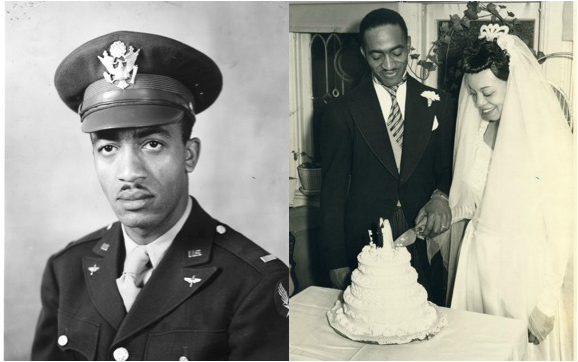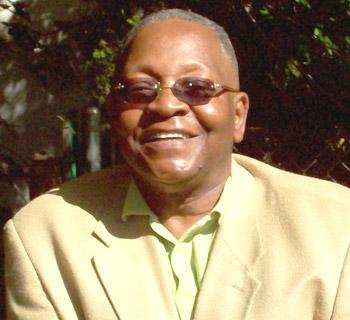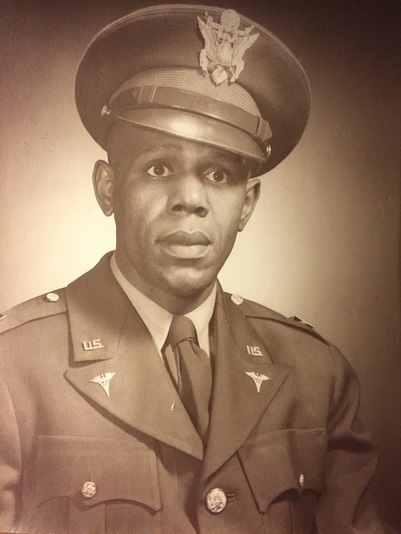Carole's Father Tuskegee Airman Wilson Copeland Honored at The March 3, 2016 Black History Breakfast3/1/2016 His stories and expansive capacity to understand world issues were unrivaled. From an impoverished background to graduating from college and survived the bitterness of American racism and discrimination, my father, the late Wilson A. Copeland, was indeed a unique individual. I yearn to travel and understand the world just like him. I navigate the world as an entrepreneur because of him. Our relationship was sometimes topsy turvy, but he was my dad and I loved him. He was a Tuskegee Airman, and we will honor him at Thursday's Black History Breakfast. =================================== The Late Wilson Albert Copeland was born in 1917 in Clinton, South Carolina to Carrie and Bradley Copeland. When his parents divorced he moved to Bel Air, Maryland with his mother and older brother, Eugene. (His mother eventually remarried John Brown in Bel Air, Maryland. Brown was a World War I Veteran.)
Mr. Copeland was enrolled in the then segregated Bel Air/Harford County school system, a system which at that time only provided educational opportunities for Blacks through the ninth grade as further education and training were discouraged beyond that point for people of color. Because of those circumstances, his brother sought employment, soon married his sweetheart Marguerite, and had one son, Charles (now all deceased). Encouraged by his mother and driven from within, he rented a room from the Marshall family who lived in Baltimore directly across the street from Douglass High School, some thirty miles from Bel Air. Working in Baltimore during the week and hitchhiking and working back in Bel Air on the weekends, he graduated from Douglass High School in 1937 and won a scholarship to Virginia State College for Negroes. He went on to obtain a bachelor’s degree in business administration from the college in 1941. After a brief period working in Maryland, Wilson Copeland joined the military as America entered World War II. Mr. Copeland trained at Tuskegee Army Air Field in Tuskegee, Alabama as a Second Lieutenant in the United States Army Air Corps during the war. He would later be known as one of the Tuskegee Airmen. (An ulcer prevented him from completing pilot school, although he continued on in a leadership role in the US Army Air Corps.) A bitter remembrance of racism for him was traveling with other Black soldiers on a military train in the South. Arrangements had been made with restaurants in the region to feed the soldiers. On one occasion the Black soldiers were brought cold box lunches and were forced to eat their meals onboard the trains. In another car, the German prisoners of war were escorted off the train and were allowed to eat hot meals inside of the restaurants along the route. Later he served as the Adjutant Officer assigned to the B25 Bombers at Selfridge Air Force Base in Michigan. Following his honorable discharge, he found employment and moved to Detroit, renting a room in a boarding home in the Black section of the city. The owner of the building, Rev. James A. Charleston, lived next door with his wife, Nora Dean and school teacher-daughter Gwendolyn. One thing led to another when Wilson and Gwendolyn met. They married on December 22, 1946. From this union two children are born, Wilson A Copeland II in 1949 and Carole Dean Copeland in 1953. (Carole was named after both grandmothers—changing Carrie to Carole and using “Dean” from Nora Dean. Instead of a “Junior,” the son became Wilson A. Copeland II.) Active as a Trustee at St. Paul AME Church (pastored by his father in law, Rev. Charleston), Mr. Copeland was engaged in successful business ventures in Detroit including co-ownership in Blue Flame Oil Company. Despite that success, he yearned to build a business in one of the newly independent and developing nations on the African continent. His widespread travels throughout Africa led to marginal and less than successful business projects in Ghana (West Africa) in 1959, shorty after its independence. One of his American business partners was Rev. Albert Cleage, father of the celebrated writer Pearl Cleage. Sadly his marriage failed and he divorced in the early 1960s. Although he married briefly years later, he would never lose affection for his beloved Gwendolyn. He was eventually recruited by the United States Department of State and spent twenty years working for various posts at the American Embassies in Ghana, Nigeria and Liberia. His last eight years of government service were in Nairobi, Kenya. Mr. Copeland retired in 1979, lived briefly in Pennsylvania near his daughter and her family before relocation to Los Angeles. He enjoyed telling stories of his numerous adventures, which included safaris, participating in several historical events, including the first meeting of the Organization of African Unity in Ethiopia in 1963. Mr. Copeland also rescued an American diplomatic pouch and was stranded in Accra, Ghana in the middle of a military coup. At great risk to himself, Mr. Copeland was able to get to the airport, extract the courier and the pouch, and in spite of having to get by several army road blocks and being shot at and chased by rebels, was able to safely return the courier and the pouch to the American Embassy. For this act, he was awarded a State Department Commendation and was made an honorary member of the Embassy Marine Corp Guard. Travel was second nature to Mr. Copeland and the world was his living room. Even after being diagnosed with lung cancer in the late 1980s, he continued to live life to the fullest, frequently driving cross country from California to the East Coast to visit friends and family. He enjoyed his 50th college reunion in Petersburg, Virginia in 1991 and then traveled to Detroit, where he visited with his son and his family and attended the Tuskegee Airmen Convention. His travels took him to Costa Rica in October 1991, before returning to his home in Los Angeles. Wilson A. Copeland departed this life on October 31, 1991, with his spirit, pride and dignity intact. He was buried in the family plot at Elmwood Cemetery in Detroit. Years later in 1998 his first wife, Gwendolyn would be buried next to him. Wilson Copeland was a member of Kappa Alpha Psi Fraternity, the Masons and the Tuskegee Airmen, Inc. The Black History Month Breakfast will be held on Thursday March 3, 2016 at the Boston Colonnade Hotel from 8:30 am to 11:00 am.
0 Comments
Resourceful, resilient and transformational, Vietnam Era Veteran Haywood Fennell knows how to reach out to the community with gusto. We look forward to honoring him at the March 3rd Black History Breakfast. =================== Fusing Compassion and Community, Learning and Literacy, Haywood Fennell, Sr. continues to add dimensions to his writings. Born in New York City, the now Boston resident recently self-published the first book from The Coota Experiences Trilogy, Coota and the Magic Quilt, (ISBN No. 0-9720404-0-4) and has completed writing the second book, Coota and the Challenge. (ISBN 0-97204046-3).
A well-respected figure in Boston, Haywood is often called a Renaissance Man because of his prolific writings, which draw upon our history for his source material. He is an ex-offender who has refused to allow his past mistakes to hold him “hostage.” He is well known throughout the City of Boston as an advocate for prison reform. A great deal of his work centers around transitional services. He serves on the Board of Directors of the Stanley Jones Clean Slate Project; an ex-offender think tank working to educate and to empower those marginalized by the CORI Laws. Haywood advocates for professional social/mental health services as soon as the person enters the prison system. He helps by visiting jails and prisons and talking about the importance of opening up to change the mindset from wanting to be a smooth criminal to become with skills development a taxpayers a opposed to tax-burden. Also, a Vietnam Era veteran, who served nearly six years in the US Army as a clerk, photographer, and information specialist, Haywood founded The Tri-Ad Veterans’ League; a veterans’ rights advocacy organization where the members incorporate their military skills with program development for educational/cultural programs, particularly around incarceration and HIV/AIDS. The League recently partnered again with The Boston Local Vulcans Society of African-American Firefighters to produce the annual (televised) 9/11 Memorial Service. Presently, the veterans’ organization he founded works withNortheastern University to improve health care services. Their current project focuses on health disparities for African-American veterans that seek health care from the Veterans Administration Medical Centers. Haywood co-hosts a popular weekly cable television program called Speaking About, which welcomes a weekly guest list of community champions who have updates to share and ideas to discuss. This soft-spoken author/playwright has written, produced and staged eight annual performances of the cultural education play,The Harlem Renaissance Revisited With a Boston Flavor (the show’s title will change in the 2007 season toA Story from the Harlem Renaissance.) Haywood attended public school in Wilmington, N.C. and on to Boston University where he studied Urban Planning and U/Mass Boston’s College of Community and Public Service studying Urban Issues. He is the Boston Editor for Unity First, a Springfield, MA based diversity community newspaper. Haywood received the prestigious Boston Neighborhood Fellow’s Award in 2003. He serves on the Advisory Board of the William Monroe Trotter Institute at U/Mass Boston and sits on the board at Boston’s Urban League. He is a lecturer on the Harlem Renaissance Era and its importance to American history and served as a member of the Judging Committee for Reflection in Action; Building Healthy Communities, sponsored byThe Harvard Medical School Office for Diversity and Community Partnership and as a Presenter for theCommunity Enrichment Fellows 2004 and as a member of Roxbury Community College Community Advisory Group. He was named as Boston Herald Literacy Hero in 2005. He was honored on November 4th, 2005 as one of the 100 Distinguished Black Men sponsored by ThePrince Hall Masons of Boston, MA. When speaking to youth, and especially on prison visits, Haywood talks about his going from stealing books to writing books and how is life was changed by other people praying for him, when he would not pray for himself. Haywood’s second Coota book, Coota and the Challenge, will release in early 2007. In 2006 he completed This Man: Thoughts About Our Times, an anthology of his of poetry and prose. He also enjoys freelance photography. The Black History Month Breakfast will be held on Thursday March 3, 2016 at the Boston Colonnade Hotel from 8:30 am to 11:00 am. Biography Of The Late
Captain James Franklin Fitzgerald, M.D. U.S. Army Medical Corp Written by his Son in Law, Attorney Wilson A. Copeland, II Dr. James Franklin Fitzgerald was born in February,1919 to James and Lillian Fitzgerald and lived in Wilmington, Delaware from his birth through high school graduation. His undergraduate life was spent at Pennsylvania’s Lincoln University, where he became a member of the Kappa Alpha Psi Fraternity, followed by what proved to be his inadvertent path to a most memorable military experience, matriculation at Meharry Medical College in Nashville, Tennessee, where he received his M.D. degree. Like all other American medical schools, Meharry was taken over by the United States Army during the Second World War due to the pressing need for physicians, dentists, and nurses in the Armed Forces. This situation resulted in the students essentially being conscripted, with their tuition being paid by the government, going to class in uniform, attending school year round, with graduations being conducted three times a year and culminating in reporting for duty following a one year internship. March of 1944 proved to be a busy month for James Franklin Fitzgerald; graduating from Meharry on the 19th, marrying Fisk University graduate, Alberta Price on the 26th, and establishing a new home for his bride and himself in Washington, D.C., where he would spend his next year as an intern at Howard University’s Freedom Hospital. While at Freedman’s, a pyrrhic victory of sorts occurred when a letter from the Army arrived advising him that the ebbing World War had resulted in a reduction of the need for health care professionals and he needn’t report for duty. Thus, upon completion of his internship, he headed for Detroit, Michigan to begin his practice and, where believing himself to be in the Army Reserve, he gave short shift to the letters from the U.S. Navy that arrived in the late 1940’s, believing them to be recruitment efforts and knowing the Navy was the least receptive of all the Armed Services about President Truman’s 1948 desegregation orders. The onset of hostilities in Korea were the precursor to a visit to his office from the two FBI agents who arrested him for failing to report for induction; it seems those ‘recruiting letters’ were in fact notices advising him that he had been transferred to the Naval Reserve. He was released from a federal detention cell that evening with the understanding he was to report for duty the next day. He did, entering the office of the Naval Recruiting Center that morning, the officer on duty took one look at him, asked with some degree of chagrin and incredulity, “You’re James Franklin Fitzgerald?” and receiving the affirmative reply, immediately blurted out, “There must be some mistake, just go home and we’ll contact you sometime in the future.” It seems the name James Franklin Fitzgerald fit someone ‘From the Old Sod’ – his skin color, however, did not – and the Navy realized there had indeed been a mistake. Over the next few months, an administrative transfer back to the Army took place and Captain James Franklin Fitzgerald, M.D. found himself in a MASH unit in Korea, where he served with distinction from 1952 to 1954. During the course of his service in Korea, Captain Fitzgerald was awarded three Purple Hearts. One coming as a result of assisting in a surgical procedure on a wounded GI and together with the rest of the surgical team, continuing the operation, despite incoming artillery shells, for this act the Purple Heart he was given for the injuries caused by those shells was accompanied by the Bronze Star. Returning to Detroit after completing his service to his country, Dr. Fitzgerald practiced medicine until his untimely death from an untreatable abdominal infection on Thanksgiving Day 1960 at the age of 41. He was survived by his wife, Alberta and their daughter, Deborah Fitzgerald Copeland. ==================== Deborah Fitzgerald Copeland will fly in from her home in Detroit, Michigan to received the Black History Month award on behalf of her late Father. Special Thanks to JET BLUE AIRLINES, who are Breakfast Sponsors and responsible for Mrs. Copeland's travel arrangements. =================== The Black History Month Breakfast will be held on Thursday March 3, 2016 at the Boston Colonnade Hotel from 8:30 am to 11:00 am. |
* * * * * * * *Archives
August 2023
|
©2024 All Rights Reserved Carole Copeland Thomas • (508) 947-5755 • Carole@mssconnect.com




 RSS Feed
RSS Feed